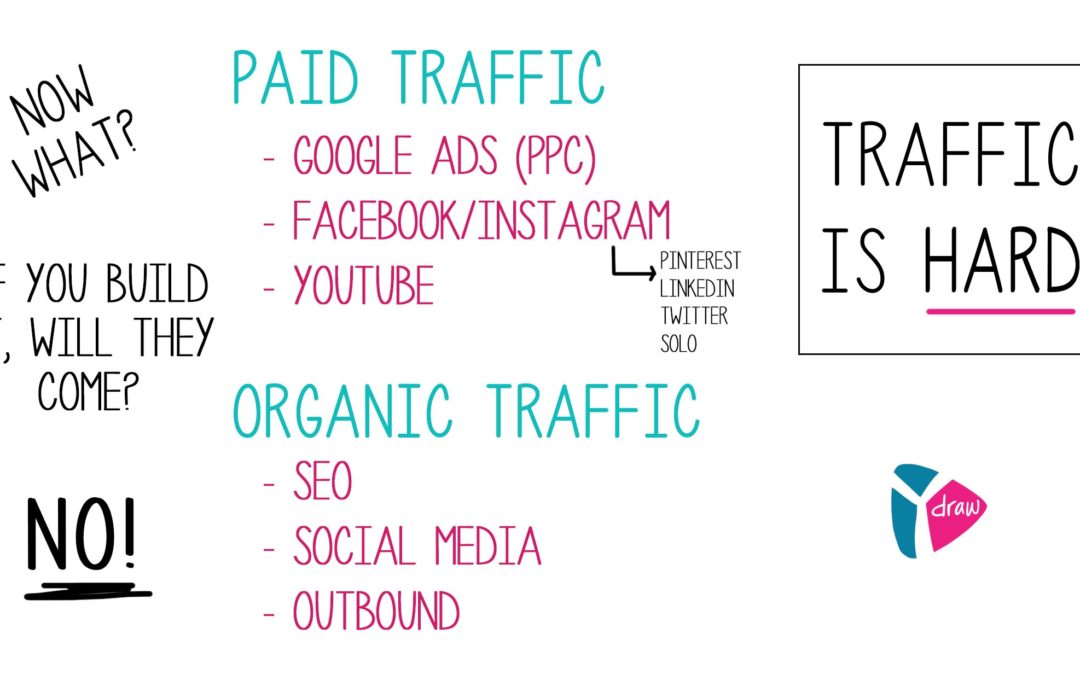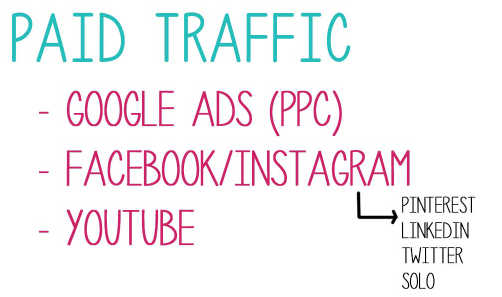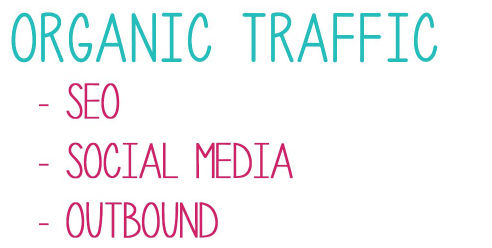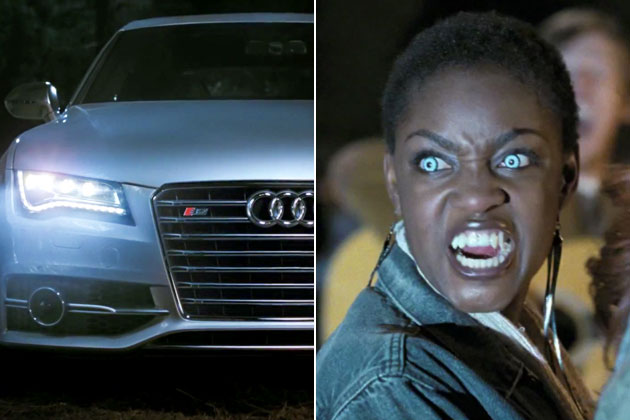
What is Traffic? – Moron Monday
So what’s the difference between Paid Traffic and Organic Traffic? What even is TRAFFIC? Is it really possible to get on the 1st page of google? Watch this week’s episode of Moron Monday to find out. The answer might surprise you!
If you missed last week’s episode, you can watch it here. (We talked about creating the right message for your target audience)
VIDEO TRANSCRIPTION
Hey guys. What’s up? This is Jace with another episode of Moron Monday. This is actually one of my favorite episodes which is, Traffic. We’re going to talk about paid traffic today. We’re going to be talking about organic traffic.
Now, is traffic hard? I put this up here first. Yes, traffic’s hard. Yes, this is difficult. Can you do this alone? Probably not, unless this is your full time job.
Now, you have to also be careful because this is where most people are being sold. You’re getting phone calls all day that say, “Hey, we’re going to rank you #1 on Google.” All of you have probably got those phone calls and it’s BS. A lot of people are saying, “Hey, I’m going to get you thousands of Facebook leads, for $3 a lead.” Are they good leads? Probably not.
This is where the good marketers and all of the bad marketers separate themselves. When you find somebody who really knows what they’re doing at Google Ads, you’re going to get an ROI. If you know somebody who’s really good at Facebook, you’re going to get an ROI there. But first, you have your video, you have your website, everything’s sitting there ready to go.
So, now what? If you build it, will they come? No, they will not. Just because you have a video, just because you have your website, doesn’t mean you’re going to sell your product or service.
That’s probably the number one thing I see, people come to us, we create their video, we give it to them, it sits. Then they call us a year later saying, “Hey, I need help.” So, let’s go over that.
Paid Traffic
The very first thing, paid traffic. Now, I like paid traffic and I recommend everyone out there to do a Google Ads campaign. Why do I say that? Because Google Ads always have an ROI. Now, if you bid position one, or even two, three, you might not get a return on investment there. But you might say, “Okay, I’m going to bid a few cents, position six, seven, eight.” And you’ll get a return on investment later on. But you just have to play the game and you have to optimize Google Ads.
Google Ads is not a set it and forget it thing.
You need to be on there every day, adding negative key words, until you get everything dialed in. Then you can let it run. I love Google Ads because people are searching for your product and service. So, somebody types in plumber in California, and you pop up as a plumber in California, pretty efficient. Got it?
Facebook and Instagram
Next, Facebook and Instagram, I love Facebook, I love Instagram, I run ads there all the time.
It is cold traffic. What that means is you need to nurture them. You can’t just run a simple ad and hope they convert. You need to run an ad, run a remarketing ad, get multiple touches. All this stuff, the reason you’re doing everything is because you want to get multiple touches.
I harp on that a lot because, I myself, I take probably 12 to 15 touches before I buy a product or service, so you’re going to use all this.
Facebook, Instagram, I like. If you’re marketing anything like in the sports industry, sports products, fitness products, weight loss products, all that stuff, Instagram’s probably your play. Boutiques, Instagram’s your play. I have tons of tutorials on Facebook and Instagram ads.
I also have set up some tutorials on YouTube, I love YouTube ads. Not a lot of people are doing it, they’re new. They are getting better and better with Google and how they’re optimizing things, so I like YouTube ads.
Pinterest, LinkedIn, Twitter, and Solo Ads
There’s other ones. You have Pinterest, LinkedIn, Twitter, Solo Ads, all these ones are great but they’re not as efficient nor do they have all the tracking capabilities and all the targeting that these other ones have.
Now, LinkedIn is good if your product or service is 7 to 10 thousand dollars, then you could probably do LinkedIn. Got it?
Organic Traffic
Now, organic traffic. This is a tough one.
SEO, let’s talk SEO. SEO is search engine optimization. Is SEO easy? No, it is one of the most competitive. Because think about it, you’re competing against some of the the biggest company’s Yelp.com. You’re trying to take the number one spot from Yelp, or you’re trying to take the number one spot from the biggest companies in the world, who are spending thousands, if not hundreds of thousands of dollars on search engine optimization.
Normally how this goes is you get a call, somebody says, “Hey, I’m going to get you ranked number one on Google.” And you’re like, “Hey, that’d be great, perfect. How much is it?” They sign you up for some fee and six months down the road, a year down the road, you see nothing. This is why SEO is a problem.
One of my companies I started, we did awesome at SEO for two years, Google changed the rules and all of a sudden it was like, okay we’re on page two. Bigger companies went ahead of us and we can’t seem to beat them out.
Other companies that I’ve done stuff with, we’d get lucky, we’d beat out a lot of people. But does it take time? Yes. If you think that you’re going to dominate in search engine optimization, you need to plan on a year, minimum. Two years is a good number and it takes huge amounts of content, takes back links. That’s the only way.
If you’re being sold on SEO, be careful because it is a game that is difficult. Google changes the rules all the time and it requires you to beat out the big boys. Got it?
So be careful with SEO. I always say create your own content and do 15 hundred word articles, if you want to win at that game.
Social Media, Daily Posts, and Interaction
Social media, daily posts, interacting with your audience. This works really well. A lot of people don’t interact with businesses, so just know that.
If you’re going out there posting on your Instagram, your Facebook, and thinking hey, why aren’t I getting any interactions? It’s probably because you’re under your business name, not a lot of people interact with businesses.
Outbound
And the other one is Outbound. You can outreach to people. I do a LinkedIn outreach, which is Outbound. I do cold emails. That works really well, so there’s a lot of Outbound tactics that you can use to get traffic.
The whole idea of everything here is to get people to your website so that they can listen to your message, and fill out a form or give you a call and do business with you.
Which ones do I recommend? Which ones do I like the most? I like them all. I do them all.
I don’t know which one’s going to convert the best. So, the best thing you can do is start with everything and then eliminate. If SEO is just not your thing, eliminate it. But I like to do everything here.
You don’t need to put all your budget into one spot. You can say five dollars here, five dollars here, ten thousand here, ten thousand here, just depends on your budget.
I hope that helped. Go out there and start pushing the traffic, because that’s what matters. That’s what’s going to get you the conversions. Then follow this up with an actual remarketing campaign.
Don’t just go out there and send traffic to your website, go out there, get the traffic, follow it up with a remarketing campaign and nurture it with an email campaign. Which we will talk about on the next episode.
If you have questions, look us up. You can go to our different websites. You’ve got ydraw.com or you’ve got marketinghy.com, reach out to us, we’d be happy to help. That’s it. Peace.



